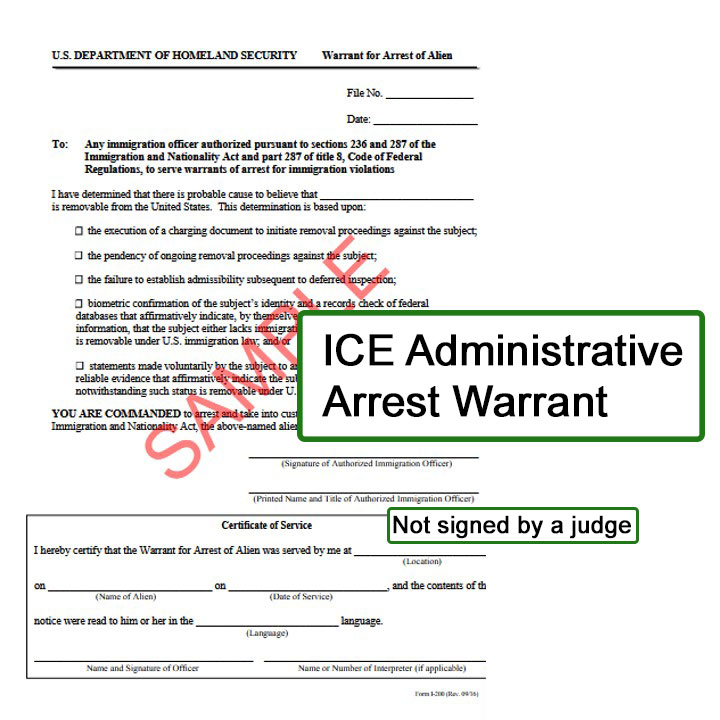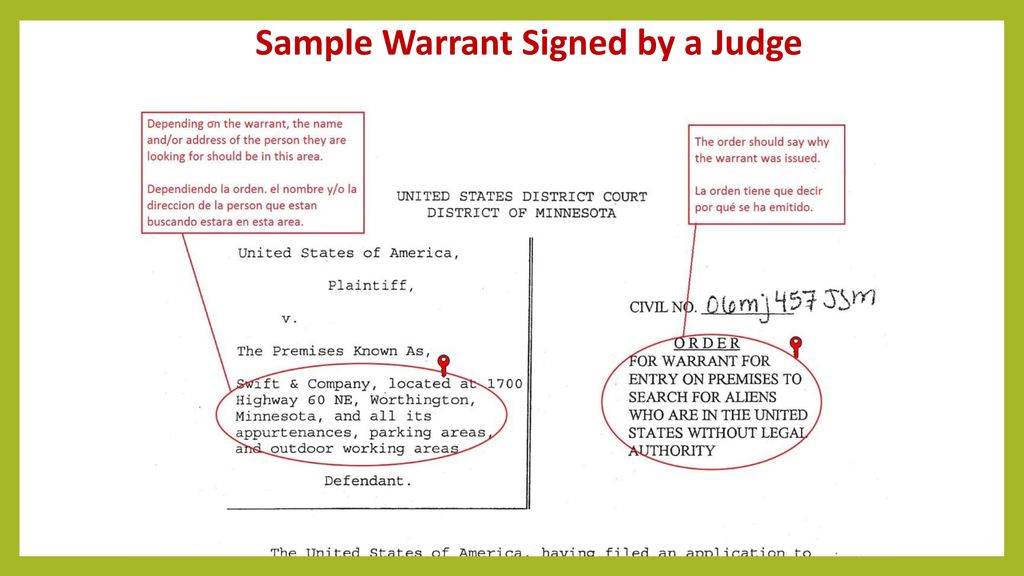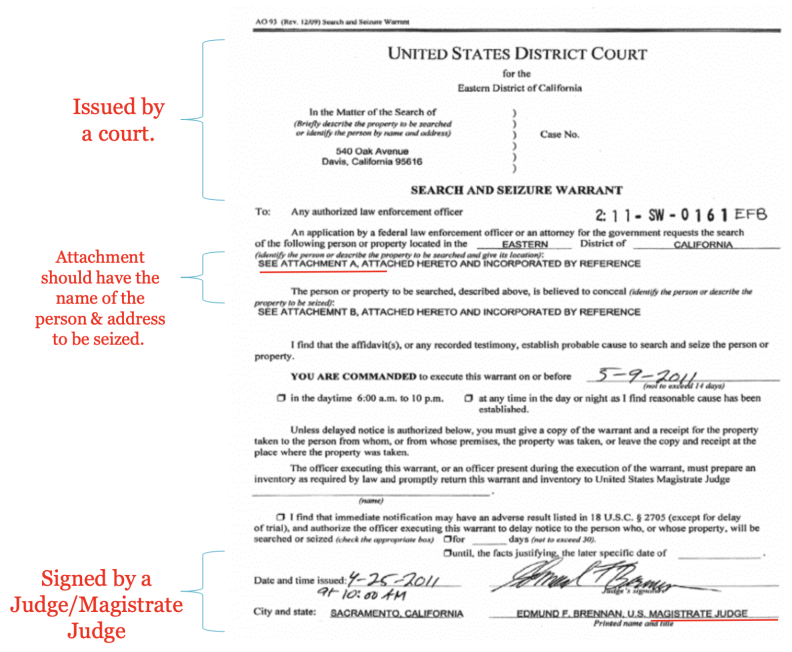Does A Warrant Have To Be Signed By A Judge - The revised rule provides discretion to the judge to issue an arrest. A warrant is a written court order signed by a judge or magistrate authorizing a police officer to conduct a search, seizure, or. Some of the issues are whether the search warrant was served in a timely manner, which is within ten days of the day on which the. Warrant is issued by a judicial court. Courts that issue judicial warrants include both state and federal courts, such as a “superior court of. O a judicial warrant is an official court order signed by a judge or magistrate that authorizes a search of private property, seizure, or arrest. Under the current rule, the judge must in all cases issue an arrest warrant.
Some of the issues are whether the search warrant was served in a timely manner, which is within ten days of the day on which the. Warrant is issued by a judicial court. A warrant is a written court order signed by a judge or magistrate authorizing a police officer to conduct a search, seizure, or. O a judicial warrant is an official court order signed by a judge or magistrate that authorizes a search of private property, seizure, or arrest. Courts that issue judicial warrants include both state and federal courts, such as a “superior court of. The revised rule provides discretion to the judge to issue an arrest. Under the current rule, the judge must in all cases issue an arrest warrant.
A warrant is a written court order signed by a judge or magistrate authorizing a police officer to conduct a search, seizure, or. Some of the issues are whether the search warrant was served in a timely manner, which is within ten days of the day on which the. Courts that issue judicial warrants include both state and federal courts, such as a “superior court of. Under the current rule, the judge must in all cases issue an arrest warrant. The revised rule provides discretion to the judge to issue an arrest. Warrant is issued by a judicial court. O a judicial warrant is an official court order signed by a judge or magistrate that authorizes a search of private property, seizure, or arrest.
F r o w z y I n d u l g e n c e s
Courts that issue judicial warrants include both state and federal courts, such as a “superior court of. The revised rule provides discretion to the judge to issue an arrest. Under the current rule, the judge must in all cases issue an arrest warrant. A warrant is a written court order signed by a judge or magistrate authorizing a police officer.
Sample Warrant 2 Signature and other requirements 17 CSW 3438
Under the current rule, the judge must in all cases issue an arrest warrant. The revised rule provides discretion to the judge to issue an arrest. O a judicial warrant is an official court order signed by a judge or magistrate that authorizes a search of private property, seizure, or arrest. Courts that issue judicial warrants include both state and.
Immigration Enforcement FAQs OISS Rice University
A warrant is a written court order signed by a judge or magistrate authorizing a police officer to conduct a search, seizure, or. Courts that issue judicial warrants include both state and federal courts, such as a “superior court of. Some of the issues are whether the search warrant was served in a timely manner, which is within ten days.
Know Your Rights If You Encounter ICE National Immigrant Justice Center
O a judicial warrant is an official court order signed by a judge or magistrate that authorizes a search of private property, seizure, or arrest. Warrant is issued by a judicial court. A warrant is a written court order signed by a judge or magistrate authorizing a police officer to conduct a search, seizure, or. Courts that issue judicial warrants.
Know Your Rights making knox college a sanctuary
A warrant is a written court order signed by a judge or magistrate authorizing a police officer to conduct a search, seizure, or. Under the current rule, the judge must in all cases issue an arrest warrant. Warrant is issued by a judicial court. The revised rule provides discretion to the judge to issue an arrest. Some of the issues.
What Is A Warrant Of Attorney Confess Judgment
O a judicial warrant is an official court order signed by a judge or magistrate that authorizes a search of private property, seizure, or arrest. The revised rule provides discretion to the judge to issue an arrest. Under the current rule, the judge must in all cases issue an arrest warrant. Some of the issues are whether the search warrant.
How To Know If You Have An Arrest Warrant JudgeDumas
A warrant is a written court order signed by a judge or magistrate authorizing a police officer to conduct a search, seizure, or. The revised rule provides discretion to the judge to issue an arrest. Some of the issues are whether the search warrant was served in a timely manner, which is within ten days of the day on which.
Creating a Safety Plan Prepara un plan de seguridad ppt descargar
Some of the issues are whether the search warrant was served in a timely manner, which is within ten days of the day on which the. Warrant is issued by a judicial court. The revised rule provides discretion to the judge to issue an arrest. Under the current rule, the judge must in all cases issue an arrest warrant. O.
Know your rights
Warrant is issued by a judicial court. O a judicial warrant is an official court order signed by a judge or magistrate that authorizes a search of private property, seizure, or arrest. A warrant is a written court order signed by a judge or magistrate authorizing a police officer to conduct a search, seizure, or. Courts that issue judicial warrants.
Judicial Warrant vs. Administrative Warrant Luminus
A warrant is a written court order signed by a judge or magistrate authorizing a police officer to conduct a search, seizure, or. Under the current rule, the judge must in all cases issue an arrest warrant. Some of the issues are whether the search warrant was served in a timely manner, which is within ten days of the day.
The Revised Rule Provides Discretion To The Judge To Issue An Arrest.
Warrant is issued by a judicial court. A warrant is a written court order signed by a judge or magistrate authorizing a police officer to conduct a search, seizure, or. O a judicial warrant is an official court order signed by a judge or magistrate that authorizes a search of private property, seizure, or arrest. Under the current rule, the judge must in all cases issue an arrest warrant.
Some Of The Issues Are Whether The Search Warrant Was Served In A Timely Manner, Which Is Within Ten Days Of The Day On Which The.
Courts that issue judicial warrants include both state and federal courts, such as a “superior court of.









